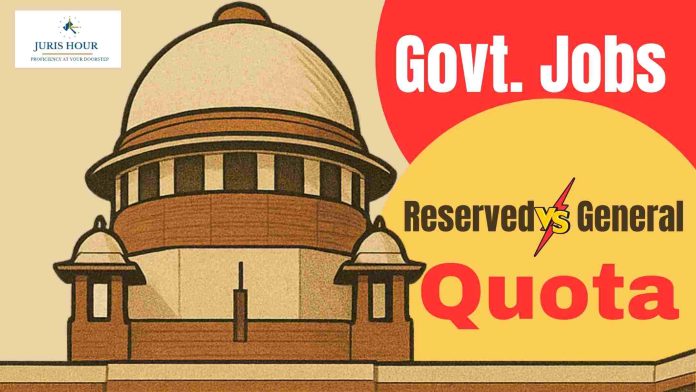The Supreme Court has ruled that candidates from reserved categories who avail themselves of concessions such as age relaxation cannot subsequently be considered for recruitment under the unreserved (general) category.
The bench of Justice Surya Kant and Justice Joymalya Bagchi has observed, “Reserved candidates who avail relaxations in age, fee, or other eligibility conditions cannot claim unreserved seats if the governing rules expressly prohibit such migration”.
The decision came in a batch of appeals filed by the Union of India against a 2018 judgment of the Delhi High Court that had permitted certain OBC candidates to migrate to the general category despite having availed age relaxation during the recruitment process.
The dispute stemmed from a Staff Selection Commission (SSC) recruitment notification for Constable (GD) posts in BSF, CRPF, ITBP, SSB, NIA, SSF and Rifleman in Assam Rifles. The prescribed age limit was 18–23 years as on August 1, 2015, with OBC candidates entitled to a three-year relaxation.
A group of OBC candidates, who had availed this age relaxation, failed to secure selection in the OBC quota but had scored higher marks than the last selected candidates in the unreserved category. They approached the Delhi High Court, which ruled in their favour, holding that merit should prevail and that denying them unreserved seats violated Article 14 of the Constitution.
The Union of India opposed this interpretation, citing an Office Memorandum dated July 1, 1998, which explicitly prohibits reserved category candidates who avail relaxations in age, experience, or number of attempts from being considered under unreserved vacancies.
A Bench of Justices Surya Kant and Joymalya Bagchi overturned the High Court’s ruling, observing that the High Court had erroneously applied the precedent in Jitendra Kumar Singh v. State of UP (2010). The Court clarified that Jitendra Kumar was decided in the context of Uttar Pradesh’s 1994 Reservation Act and related government instructions, which permitted such migration.
However, in the present case, the 1998 Office Memorandum imposed a clear embargo against such migration, distinguishing it from Jitendra Kumar. The Court also relied on precedents including Deepa E.V. v. Union of India (2017), Gaurav Pradhan v. State of Rajasthan (2018), and Niravkumar Dilipbhai Makwana v. GPSC (2019), which had upheld similar restrictions.
The Supreme Court held that since the respondents had availed age relaxation, they were ineligible for consideration under the general category. It set aside the Delhi High Court’s 2018 order, allowing the Union’s appeal.
The ruling reinforces the principle that concessions provided to reserved categories are linked to their quota and cannot be used to claim general category positions when rules bar such migration.
Case Details
Case Title: UOI Versus Sajib Roy
Case No.: SLP (C) Nos.21392-21393/2019
Date: September 09, 2025
Read More: Part Of CBIC Circular Blocking GST Refund Claims Under Inverted Duty Structure Quashed: Rajasthan HC

